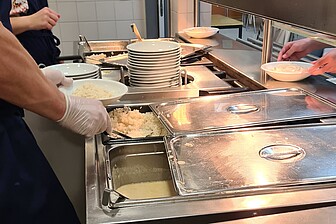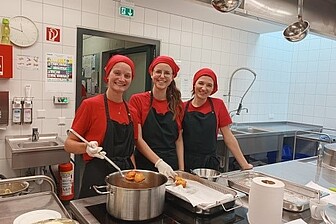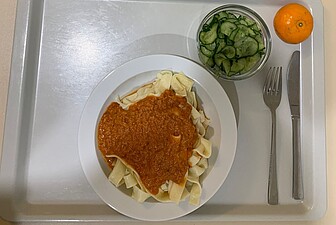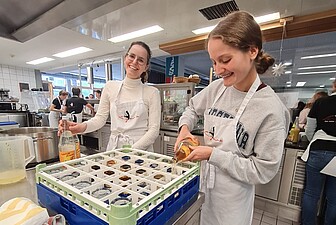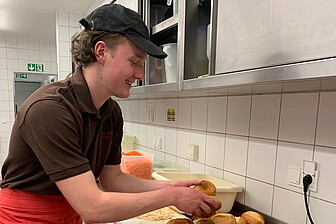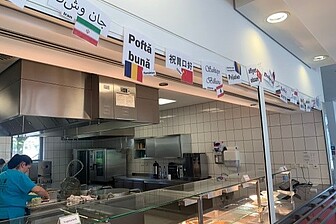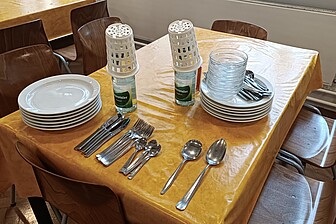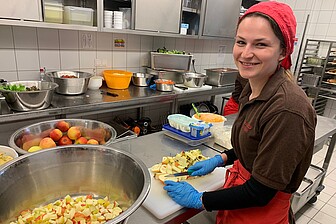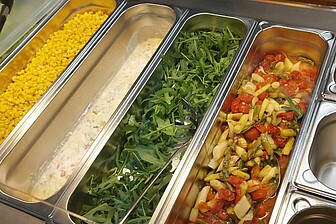Food for Future - Sustainable Nutrition in School Canteens
Our diet contributes to 30% of global greenhouse emissions and thus to anthropogenic climate change. For transformations towards sustainable development in the sense of the United Nations Sustainable Development Goals (SDGs), the local level of action and the food system are therefore a key starting point. Out-of-home catering, i.e. food in public institutions such as universities, schools, kindergartens and hospitals, is a central factor in contributing to a nutritional transition, i.e. the establishment of sustainable food systems.
In the "Food for Future" project, students go to school in teams in Baden-Württemberg to learn more about sustainability in school canteens. They visit school kitchens and learn about the everyday challenges of managing a canteen. In short interviews, they ask pupils, teachers, kitchen staff and parents involved about their views and wishes with regard to school meals: What is important to them when it comes to school meals? What role do sustainability aspects play in school meals? Which forms of pupil participation make sense? At the end, the students develop recommendations for action for the sustainable design of school lunches.
The inter- and transdisciplinary project will take place from winter semester 2023 to summer semester 2024.
Five students from different degree programmes and nine schools in Baden-Württemberg are participating.
Participants of the team
I am studying Nutrition Management and Dietetics B.Sc. in my 4th semester at the University of Hohenheim.
I was interested in the project ‘Food for Future - Sustainable nutrition in the school canteen?’ and decided to take part in Humboldt Reloaded.
First and foremost, I think it's valuable to integrate practical research into your degree programme as early as possible and to gain experience outside the lectures.
I particularly enjoyed the ability to organise the work freely within the team and, of course, the visits to the school canteens. These insights were extremely useful for the final analysis of our project.
I am a student in the 6th semester of the B. Sc. in Nutritional Sciences. As part of the Humboldt Reloaded Project ‘Food for Future’, I am responsible for the public information work.
I decided to take part in the Humboldt Reloaded project in order to get to know the practical work in research better and to combine what I have learnt in my studies with practice.
I really enjoyed working with and interviewing the students in our project. The work experience in the cafeterias provided informative insights and made us aware of the great opportunities but also the challenges involved in realizing sustainable school meals. The work in the team and the team spirit in the project are also enriching.
I am currently in my 4th semester of the Bachelor's degree programme in Nutritional Science at the University of Hohenheim.
I signed up for the Humboldt Reloaded project ‘Food for future’ in order to gain practical experience in addition to the theoretical content of my studies.
By creating and analysing questionnaires for different target groups, I was able to deepen my interest in journalistic topics. I also really enjoyed being involved in various canteen kitchens. It was exciting to see the many different ways in which the ‘cook parents’ principle is successfully implemented in the individual canteens.
One special experience for me was the opportunity to visit the canteen at my former school.
My name is Valeria Schwarz and I am a 6th semester student of Nutritional Sciences at the University of Hohenheim. In the Humboldt Reloaded project, I was responsible for the coordination and organisation with the schools and canteens.
I took part in the project to gain practical research experience and apply my theoretical knowledge in practice. I particularly enjoyed working with and interviewing the pupils. Visiting the school canteens provided valuable insights and emphasised the opportunities and difficulties involved in implementing sustainable school meals.
Sustainable school meals are essential for raising awareness of environmental and health issues among the younger generation and achieving positive changes in the long term. They help to reduce the environmental impact of our diet and promote healthier eating habits.
I was very impressed by the teamwork and sense of community in the project. The collaboration on sustainable solutions and the common goal was extremely motivating and inspiring. This experience has shown me how impactful collaboration can be and the progress that is possible through collective engagement.
Lennart Stürmer
I am a student in the 5th semester of the Bsc. of Science in Agricultural Sciences.
I decided to take part in the Humboldt Project to see how research works. A sustainable food and agricultural system is the core topic of my degree programme. The Humboldt Project gave me the opportunity to gain even more detailed insights into the challenges and opportunities of a sustainable food system. Working with new fellow students who share the same interests was also an enriching experience for me.






